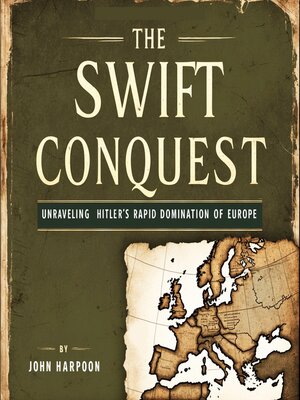The Swift Conquest
audiobook (Unabridged) ∣ Unraveling Hitler's Rapid Domination of Europe
By John Harpoon

Sign up to save your library
With an OverDrive account, you can save your favorite libraries for at-a-glance information about availability. Find out more about OverDrive accounts.
Find this title in Libby, the library reading app by OverDrive.



Search for a digital library with this title
Title found at these libraries:
| Library Name | Distance |
|---|---|
| Loading... |
The rise of Adolf Hitler and the Nazi Party did not occur in isolation but was the culmination of a confluence of societal, economic, and political factors. Post-World War I Germany was a nation in turmoil, grappling with humiliation, economic devastation, and political instability. The Treaty of Versailles, signed in 1919, placed the blame for the war squarely on Germany's shoulders, imposing severe reparations that crippled its economy. The German people, burdened by hyperinflation, unemployment, and poverty, became disillusioned with the democratic Weimar Republic, which they perceived as weak and ineffectual.
Amid this chaos, Hitler emerged as a figure of radical change. A decorated veteran of the First World War, Hitler initially joined the German Workers' Party, a small and obscure nationalist group. With his fiery oratory skills and an unrelenting focus on propaganda, he quickly rose to prominence, transforming the group into the National Socialist German Workers' Party (NSDAP), or the Nazi Party. Hitler's message was simple yet potent: he promised to restore Germany to greatness, overturn the Treaty of Versailles, and provide a scapegoat for the nation's suffering—the Jewish people and other minorities.
By the early 1920s, Hitler had crafted a political doctrine that combined virulent nationalism, anti-Semitism, and a disdain for democracy. He also sought to exploit the populace's fears of communism, which was gaining traction in Europe following the Bolshevik Revolution in Russia. The failed Beer Hall Putsch in 1923, an attempted coup in Munich, briefly landed Hitler in prison. However, this setback proved instrumental to his ideological development, as he used the time to dictate Mein Kampf, a manifesto outlining his vision for Germany's future and the expansion of Lebensraum, or "living space," for the German people.







